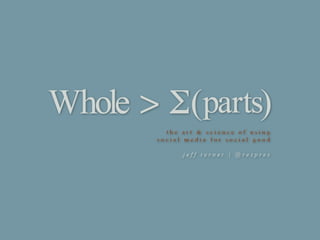
The Business Value Of Social Media For Social Good
- 2. Je ff turne r | @re spres
- 3. Je ff turne r | @re spres
- 4. Je ff turne r | @re spres
- 5. Je ff turne r | @re spres
- 6. Je ff turne r | @re spres
- 7. Je ff turne r | @re spres
- 8. Je ff turne r | @re spres Via Dr. Robert B. Cialdini
- 9. Je ff turne r | @re spres
- 10. Je ff turne r | @re spres
- 11. Je ff turne r | @re spres
- 12. Je ff turne r | @re spres
- 13. Je ff turne r | @re spres
- 14. Je ff turne r | @re spres
- 15. Je ff turne r | @re spres
- 16. Je ff turne r | @re spres
- 17. Je ff turne r | @re spres
Notas do Editor
- \n
- \n
- \n
- \n
- \n
- \n
- \n
- \n
- A famous example of cognitive dissonance is the Ben Franklin effect. Franklin won over a political opponent by asking him a favor and he relates thus:\n\n"I did not aim at gaining his favour by paying any servile respect to him but, after some time, took this other method. Having heard that he had in his library a certain very scarce and curious book, I wrote a note to him, expressing my desire of perusing that book, and requesting he would do me the favour of lending it to me for a few days. He sent it immediately, and I return'd it in about a week with another note, expressing strongly my sense of the favour. When we next met in the House, he spoke to me (which he had never done before), and with great civility; and he ever after manifested a readiness to serve me on all occasions, so that we became great friends, and our friendship continued to his death. This is another instance of the truth of an old maxim I had learned, which says, "He that has once done you a kindness will be more ready to do you another, than he whom you yourself have obliged."\n\nThis perception of Franklin has led to what has become known as the Ben Franklin effect. After lending Franklin the book, the opponent had to resolve the dissonance of his attitude towards Franklin, whom he also had just done a favor. He justified doing the favor by telling himself that he actually liked Franklin, and, as a result, he treated him with respect instead of rudeness from then on.\n
- In the basic Asch paradigm, the participants — the real subjects and the confederates — were all seated in a classroom. They were asked a variety of questions about the lines such as how long is A, compare the length of A to an everyday object, which line was longer than the other, which lines were the same length, etc. The group was told to announce their answers to each question out loud. The confederates always provided their answers before the study participant, and always gave the same answer as each other. They answered a few questions correctly but eventually began providing incorrect responses.\nIn a control group, with no pressure to conform to an erroneous view, only one subject out of 35 ever gave an incorrect answer. Solomon Asch hypothesized that the majority of people would not conform to something obviously wrong; however, when surrounded by individuals all voicing an incorrect answer, participants provided incorrect responses on a high proportion of the questions (32%). Seventy-five percent of the participants gave an incorrect answer to at least one question.\n\n
- \n
- \n
- \n
- \n
- \n
